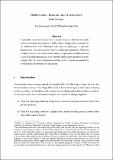Deliberation, reasons, and alternatives
Abstract
A plausible constraint on normative reasons to act is that it must make sense to use them as premises in deliberation. I argue that a central sort of deliberation – what Bratman calls partial planning – is question‐directed: it is over, and aims to resolve, deliberative questions. Whether it makes sense to use some consideration as a premise in deliberation in a case of partial planning can vary with the deliberative question at issue. I argue that the best explanation for this is that reasons are contrastive or relativized to deliberative questions.
Citation
Snedegar , J 2019 , ' Deliberation, reasons, and alternatives ' , Pacific Philosophical Quarterly , vol. 100 , no. 3 , pp. 682-702 . https://doi.org/10.1111/papq.12262
Publication
Pacific Philosophical Quarterly
Status
Peer reviewed
ISSN
0279-0750Type
Journal article
Collections
Items in the St Andrews Research Repository are protected by copyright, with all rights reserved, unless otherwise indicated.

